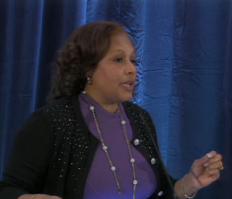MMTC's Keenan: Broadband Must Be Two-Way Connection

The smarter way to stay on top of broadcasting and cable industry. Sign up below
You are now subscribed
Your newsletter sign-up was successful
Kim Keenan, president and CEO of the Multicultural Media, Telecom & Internet Council, says MMTC needs to take policy to the people and to remain constantly vigilant.
Kennan, speaking Wednesday (Jan. 20) at MMTC's annual Broadband and Social Justice Summit, elaborating on the vigilance issue, pointed out that 32 million people are still not connected to a world "where they could become creators and not consumers."
She told her audience they needed to be impatient and to stand up and say that all children needed to be connected. She said her son describes his iPhone as his "soul." But she said that should allow him to create and participate, not simply consume and be consumed by it. "There has to be involvement," she said.
Keenan said she had been in Iowa and noted that Univision's Fusion was the only network to air the (Jan. 11) Black and Brown Forum featuring the Democratic candidates.
She said Fusion put the candidates through their paces on issues like immigration and whether kids will be deported and Black Lives Matter, and added that those issues are not getting similar airplay in the debates.
Keenan said that it was clear that what gets on the airwaves is controlled by who owns and manages those media outlets.
She talked briefly about the "rumblings" over an Oscar boycott over diversity issues. She said that when "we start watching content we want, all things will follow from there."
The smarter way to stay on top of broadcasting and cable industry. Sign up below
She said she was thrilled about the success of Empire and to see "our faces authentically represented" as, not parodies or caricatures, but mothers and friends.
But she said it is not only about who are in front of the camera, but who is behind it. She said that means continuing to push for a tax certificate policy—tax breaks for selling media properties to minority owners—so that owners will look to people of color when they look to sell.
She said the faces need to change from entry level to entrepreneur. "We don't want to keep coming back every 20 years with the same problem."
One way she suggested that MMTC was taking policy to the people was through The Santana Resolution, an effort stemming from the use of Feidin Santana's iPhone to record the shooting of a black man, Walter Scott, by a South Carolina policeman, "to use mobile video for voter protection and to document encounters with law enforcement."
She said such videos can be a way to claim the broadband power that is "rightfully ours," including to monitor polling places. She pointed out that people have talked about one reason for lack of broadband adoption was that people did not understand its relevance. Here was an example of just how relevant it could be. She said, as a lawyer, she knew how important the video was to establishing the case beyond the he said, she said.
Contributing editor John Eggerton has been an editor and/or writer on media regulation, legislation and policy for over four decades, including covering the FCC, FTC, Congress, the major media trade associations, and the federal courts. In addition to Multichannel News and Broadcasting + Cable, his work has appeared in Radio World, TV Technology, TV Fax, This Week in Consumer Electronics, Variety and the Encyclopedia Britannica.

